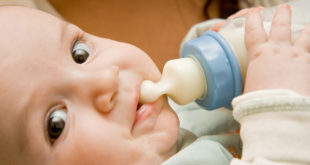Ask Anne…
Question: My baby is a month old and my nipples are so sore that I want to stop nursing and switch from breast milk to formula. How do I keep myself from becoming engorged or getting mastitis when I wean?
Answer: Before beginning the weaning process, I would really want to find out why you’re still having problems with nipple soreness. Any soreness that lasts more than two weeks, or that shows up suddenly after a period of pain free nursing is NOT normal, and should be investigated by a lactation specialist. Your baby should have gotten the latching on part down by now, and you most definitely should not experience any pain or bruising when you pump.
When you switch a baby from breast milk to formula, you need to do it gradually so that you won’t go through periods of engorgement and mastitis. Unless there is some reason to wean abruptly, such as mom needing to start chemo immediately, it is usually better to wean slowly. Before beginning the weaning process, I would really want to find out why you’re still having problems with nipple soreness. Any soreness that lasts more than two weeks, or that shows up suddenly after a period of pain free nursing is NOT normal, and should be investigated by a lactation specialist. Your baby should have gotten the latching part right by now, and you most definitely should not experience any pain or bruising when you pump.
The first thing that occur to me is that I would rule out tongue- tie (that part should be easy – any one who knows anything at all about breastfeeding should be able to evaluate that). A tongue tied baby may not be able to open wide and latch correctly, no matter how hard they try, which can cause ongoing nipple soreness that doesn’t resolve regardless of what you do as far as positioning. If tongue- tie is the problem, it can easily be correctly.
If there isn’t an anatomical problem like tongue-tie, and it hurts when you pump, you need to make sure you’re using a good double pump. Many manual pumps and inexpensive electric pumps may produce suction that is too strong and isn’t adjustable.
When pumping, you need to make sure that the flange is the right size. Pumps are designed for the average size breast, and may rub against the nipple if your breasts are larger than average. Many pumps offer adapters for different size breasts and nipples.
Another common cause of soreness is a yeast infection on the surface of the nipples or in the milk ducts. It’s hard to diagnose because it often doesn’t cause visible symptoms like redness or cracking. The article “Breastfeeding and Yeast Infections” has all the information you need about how to diagnose and treat yeast infections in you and your baby.
Before you throw in the towel on breastfeeding completely, read the article “Sore Nipples” to learn about other causes of pain at four weeks to see if there might be a problem that could be overcome. I would hate to see you wean so early and lose the many benefits of nursing if you had a breastfeeding problem that could be treated.
Anne Smith, IBCLC
Breastfeeding Basics
 Breastfeeding Basics
Breastfeeding Basics





